
Struggling to pay rent with a poor or low credit score is more common than most renters realize. Landlords often rely on credit checks when deciding whether to approve a lease, and a history of late payments can feel like a red flag. Yet having bad credit does not mean you are out of options. Rental assistance programs, co signer agreements, and budgeting support can help renters secure a place to live while working toward better financial stability.
Many landlords recognize that tenants are more than their credit scores. Steady income, proof of rent payments, and a willingness to work with housing programs can improve your chances of being approved. By learning what resources are available, renters with bad credit can still qualify for housing and avoid eviction.
A bad credit score signals to landlords and property managers that you may have struggled with debts in the past. Credit bureaus calculate these scores based on your credit report, which includes payment history, outstanding balances, and the length of your credit history. For many landlords, a score below 620 is considered a bad credit score.
If your score is in this range, you may still find affordable rental housing. Some landlords will accept tenants with low credit scores if they can provide other financial obligations on time, such as utilities or cell phone bills. Sharing this information shows that you are capable of managing payments responsibly, even if your credit history is less than perfect.
A low credit score is not the same as poor credit. Poor credit often refers to repeated late payments, charged-off accounts, or high levels of debt that hurt your ability to pay rent. A low score, however, may simply reflect a short credit history or a lack of active accounts.
Renters with a low credit score can improve their housing chances by showing proof of income, providing pay stubs, or asking an employer to verify steady wages. Demonstrating that you can comfortably afford the monthly rent can reassure potential landlords, even when credit scores are not ideal.
Credit bureaus such as Equifax, Experian, and TransUnion gather data from creditors, lenders, and even past landlords. This information shapes your credit report and determines your credit scores. Errors are common, and reviewing your credit report is a crucial step before applying for a rental property.
If you find mistakes, dispute them immediately. Correcting errors may raise your credit scores just enough to qualify for housing. For step-by-step advice, see How to Qualify for Apartments with Bad Credit.
Credit scores influence whether you are approved for an apartment, how much of a security deposit is required, and whether a co signer will be needed. Many landlords use rental applications that rely heavily on these scores. Others will also consider your rental history, income, and other factors such as savings or bank statements.
Renters should monitor their credit scores regularly. Free reports are available from the credit bureaus each year, and tools like the Consumer Financial Protection Bureau’s renter resources can guide you through the process of checking and correcting your records.
Your credit report contains detailed information on your accounts, including rent payments, credit cards, and loans. Landlords reviewing your credit report want to see a history of timely payments and reasonable debt levels. Even with bad credit, showing recent improvement on your report may improve your approval chances.
Your credit history tells landlords and property managers how you have handled money in the past. It includes details from credit bureaus, such as payment records, loans, late payments, and other financial obligations. Most landlords will review your credit report to look for red flags, like poor credit scores or a history of missed rent payments.
If your history shows steady income and timely payments, it can work in your favor even if you have a low credit score. On the other hand, a poor credit score or financial history with late payments may mean you need extra security, like a larger security deposit or a co signer.
When applying for apartments, bring proof such as pay stubs, bank statements, or letters from past landlords. These items can help prove your ability to cover rent and utility bills. Many landlords also want to see that you can manage housing costs beyond the rent itself, including bills for services and other items like groceries or gas.
If your rental history is limited, ask employers, guarantors, or community programs for references to strengthen your application. Affordable rental housing programs and rental assistance services may also help renters with bad credit demonstrate stability.
Many landlords are cautious when reviewing applications, but a prospective landlord may be willing to work with you if you show effort to improve your credit. Highlighting good credit in some areas of your financial life, like keeping current on utility bills or paying off smaller debts, can make a difference.
Be ready to explain your credit issues clearly and show how you’re taking steps to build a stronger record. Even simple actions, such as setting up automatic payments or keeping your rent account current, demonstrate responsibility and reduce the landlord’s risk.
If your credit makes it hard to get approved, don’t overlook programs that provide rental assistance. Many renters are eligible for help covering deposits or rent when they cannot come up with enough cash on their own. These funds are often available through city housing programs, nonprofits, or emergency relief offices.
Take time to search online and locally for resources that match your situation. The process may feel overwhelming, but even small amounts of aid can bridge the gap and give you a better chance at keeping stable housing.

Making rent payments on time is one of the best ways to show landlords that you are responsible, even with bad credit. Some landlords will agree to report rent payments to the credit bureaus, which can help improve your credit history over time. If your current landlord does not report, consider using services that do so. Over several months, these records can raise your credit scores and help you qualify for better housing in the future.
When submitting rental applications, bring proof of past rent payments such as receipts, canceled checks, or bank statements. Demonstrating that you can make recurring rent payments consistently builds confidence with potential landlords.
Poor credit can feel overwhelming, but honesty with prospective landlords often works in your favor. Many landlords understand that life events such as medical debt, job loss, or divorce can damage credit history. By explaining your situation and showing current financial stability, you may qualify for affordable rental housing despite past challenges.
Be proactive: offer to pay a larger security deposit, set up automatic utility bills, or provide references from past landlords. These small steps show your commitment and reduce the risk in the landlord’s eyes.
Rental assistance programs are designed to support tenants facing housing costs they cannot meet on their own. Federal, state, and local programs can cover rent, utilities, or other bills during financial hardship. Some programs target renters with low incomes, while others focus on those with bad credit or credit issues that limit housing choices.
To explore available resources, start with HUD’s rental assistance programs. Local housing authorities can also connect you to programs based on your eligibility. For more strategies, review How to Catch Up on Rent While Paying Down Debt.
A credit check is a standard part of the rental process. Most landlords request it through credit bureaus, and the results influence whether you are approved, denied, or asked to provide a co signer. Before you apply, review your credit history for errors and pay off small balances when possible.
If your credit check still shows problems, highlight other strengths on your rental application, such as steady income, references, or proof of rental assistance. For more background on your rights during this process, see Nolo’s guide to renters’ rights.
Credit issues do not have to define your rental future. Tenants can take steps such as splitting rent with roommates, negotiating rental payment terms, or seeking out property managers who specialize in working with renters who have bad credit. Some apartment owners are willing to work with tenants who show progress toward managing debt, especially if rental assistance or guarantor support is available.
Consider working with nonprofit counselors who understand both credit and housing. For example, Credit.org’s advice on improving credit scores offers practical tips that can help you repair your credit while staying housed.
A co signer is a person who guarantees rent payments if the tenant is unable to pay. This option is often used by renters with bad credit or limited credit history. A co signer reassures landlords that rent will be covered, reducing their risk. However, it is important to weigh the risks for both the tenant and the co signer. Late payments or defaults will affect both credit reports.
If you are considering this path, review the responsibilities carefully and discuss them openly with your potential co signer. Our guide on co-signing a lease with low credit offers a full breakdown of the pros and cons.
Bad credit does not mean your rental journey is over. With persistence, preparation, and the right resources, renters can find housing, improve their credit history, and secure a stable future.
If you are struggling with rental debt, past due bills, or a history of credit issues, remember that support is available. With Rent4Recovery, our housing counselors provide one-on-one guidance to help you understand your options, explore rental assistance, and build a plan to move forward. Reaching out for help today can protect your housing tomorrow.